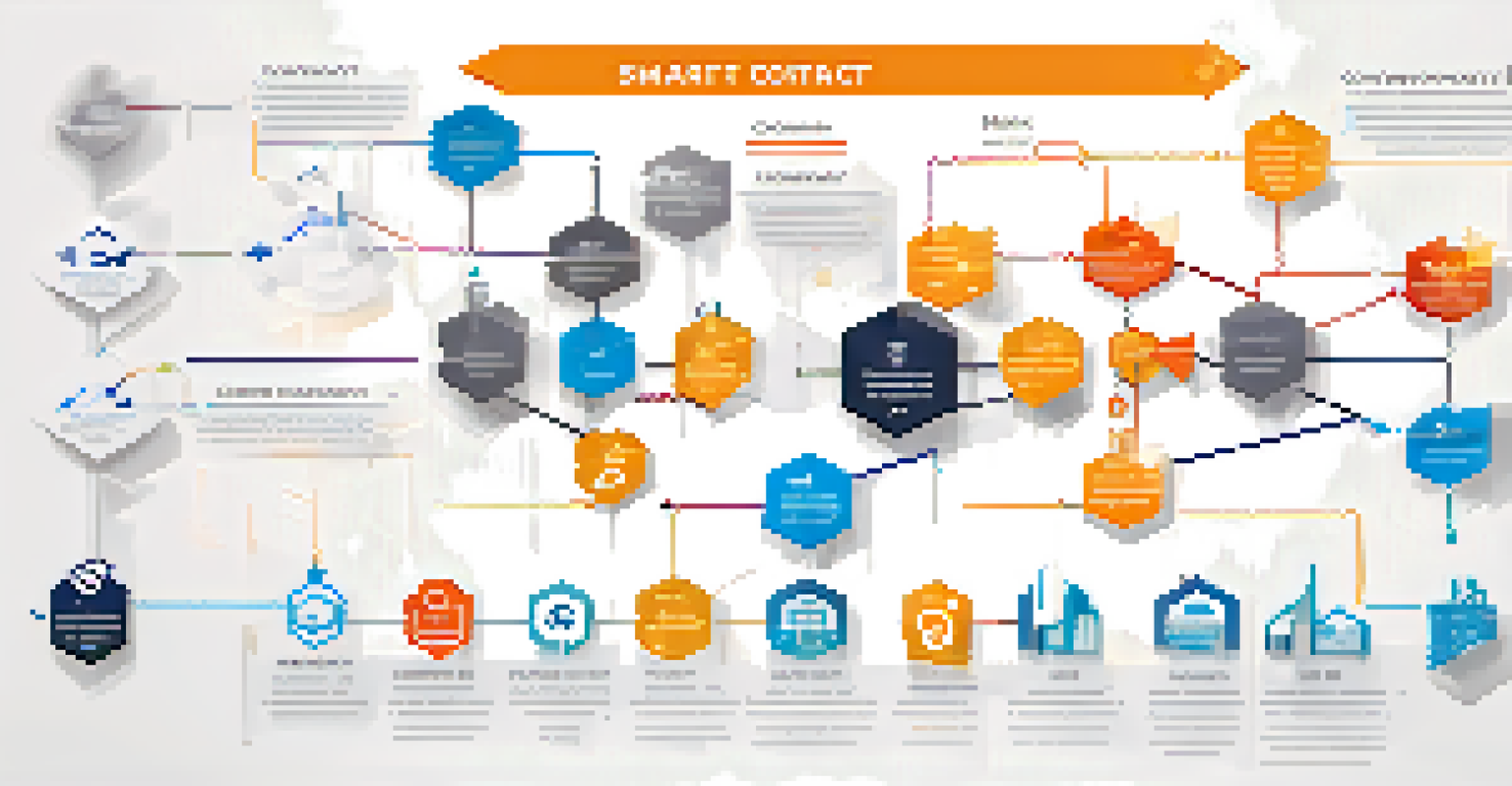Understanding Customizable Smart Contracts on the Ethereum Network

What Are Smart Contracts and Their Purpose?
Smart contracts are self-executing contracts with the terms of the agreement directly written into code. They run on blockchain technology, which ensures security and transparency. The primary purpose of these contracts is to automate processes, reducing the need for intermediaries and minimizing the risk of errors.
Smart contracts are like automated vending machines for legal agreements.
Imagine a vending machine: you put in money and select an item, and it automatically dispenses the product. In the same way, smart contracts execute transactions once predetermined conditions are met, creating a seamless experience. This automation can be applied across various industries, from finance to supply chain management.
By removing the need for trust in a third party, smart contracts empower users to engage in transactions directly. This not only enhances efficiency but also fosters innovation in how agreements are structured and executed.
How Ethereum Facilitates Smart Contracts
Ethereum is a decentralized platform that allows developers to create and deploy smart contracts. Unlike Bitcoin, which primarily focuses on peer-to-peer transactions, Ethereum provides a flexible environment for complex programmable contracts. This flexibility is a game-changer for developers looking to build decentralized applications (dApps).

The Ethereum network uses its own cryptocurrency, Ether (ETH), to power transactions and contract executions. Think of it as fuel for the network; the more complex the contract, the more ETH it may require to process. This system not only incentivizes developers to create efficient contracts but also maintains the network's stability.
Smart Contracts Automate Transactions
Smart contracts execute agreements automatically when predetermined conditions are met, streamlining processes across various industries.
Furthermore, Ethereum's robust community and extensive documentation make it easier for new developers to get started. This accessibility has led to a surge in innovative projects and has positioned Ethereum as a leading blockchain for smart contract development.
Benefits of Customizable Smart Contracts
Customizable smart contracts allow for greater flexibility in design, enabling developers to tailor contracts to specific needs. This adaptability means that businesses can create unique solutions that cater to their particular industry or operational requirements. For instance, a real estate platform can develop contracts that automatically transfer ownership upon payment completion.
Smart contracts are the digital equivalent of a handshake agreement, but with automated enforcement and transparency.
Another significant benefit is the reduction in transaction costs. By automating processes and eliminating intermediaries, businesses can save time and money. For example, a supply chain company can streamline its operations by using smart contracts to automatically trigger payments once goods are received, improving cash flow.
Moreover, customizable smart contracts enhance security. Since they operate on the blockchain, they are resistant to tampering and fraud. This added layer of security is particularly appealing for sectors that handle sensitive information, such as finance and healthcare.
Popular Use Cases for Customizable Smart Contracts
Customizable smart contracts have found applications across various industries, from finance to real estate. In finance, decentralized finance (DeFi) platforms utilize smart contracts for lending, borrowing, and trading assets without the need for traditional banks. This innovation allows users to access financial services with greater transparency and lower fees.
In the real estate sector, smart contracts can simplify property transactions by automatically managing the transfer of ownership and funds. Imagine buying a home where the contract executes once all conditions are met—no more waiting for banks or legal processes. This efficiency not only speeds up transactions but also increases trust among parties involved.
Ethereum Powers Smart Contracts
Ethereum provides a decentralized platform for developers to create smart contracts, offering flexibility and a robust community for innovation.
Additionally, supply chain management benefits from smart contracts by providing real-time tracking of goods. This transparency helps businesses ensure accountability and reduces the risk of fraud. For example, a manufacturer can set up contracts that release payments only after verifying delivery, fostering stronger relationships with suppliers.
Challenges and Limitations of Smart Contracts
Despite their advantages, customizable smart contracts are not without challenges. One major concern is the potential for coding errors, which can lead to unintended outcomes. Since smart contracts are immutable once deployed, fixing bugs can be complicated and costly, emphasizing the need for thorough testing before launch.
Moreover, the legal status of smart contracts is still evolving. Different jurisdictions may have varying interpretations of what constitutes a legally binding agreement. This uncertainty can create complications for businesses looking to use smart contracts across borders, as they must navigate a patchwork of regulations.
Lastly, while Ethereum is a popular platform, scalability issues can hinder performance, especially during peak usage times. This can lead to slow transaction speeds and increased costs, prompting developers to explore alternative blockchain solutions or layer 2 technologies to enhance performance.
The Future of Customizable Smart Contracts
The future of customizable smart contracts looks promising as technology continues to advance. With ongoing improvements in blockchain scalability and interoperability, we can expect smarter, more efficient contracts that can integrate across different platforms. This evolution will open up new opportunities for businesses to innovate and streamline operations.
Furthermore, as regulatory frameworks surrounding blockchain technology become clearer, more industries will likely adopt smart contracts. This could lead to increased standardization, making it easier for developers to create and implement contracts that comply with legal requirements.
Benefits and Challenges Exist
While customizable smart contracts enhance efficiency and security, they also face challenges such as coding errors and legal uncertainties.
Lastly, the growing demand for decentralized applications (dApps) will drive innovation in smart contract development. As more users seek out decentralized solutions, developers will be inspired to create contracts that are not only customizable but also user-friendly and accessible to a broader audience.
How to Get Started with Customizable Smart Contracts
If you're interested in diving into customizable smart contracts, the first step is to familiarize yourself with the basics of blockchain technology and Ethereum. Numerous online resources, including tutorials and courses, can help you understand how smart contracts work and how to create them. Platforms like Coursera and Udemy offer beginner-friendly courses tailored to aspiring developers.
Once you have a grasp of the fundamentals, consider experimenting with existing smart contract templates. Many developers share open-source contracts on platforms like GitHub, allowing you to learn by modifying and deploying them in a test environment. This hands-on experience will deepen your understanding and build your confidence.

Finally, joining a community of developers can provide invaluable support and resources. Online forums, social media groups, and local meetups can connect you with other enthusiasts who share your interests. Engaging with these communities can foster collaboration and help you stay updated on the latest trends and technologies in the world of smart contracts.